译林牛津八年级下册英语 unit1 语法(共40张PPT)
- 格式:ppt
- 大小:1.54 MB
- 文档页数:40
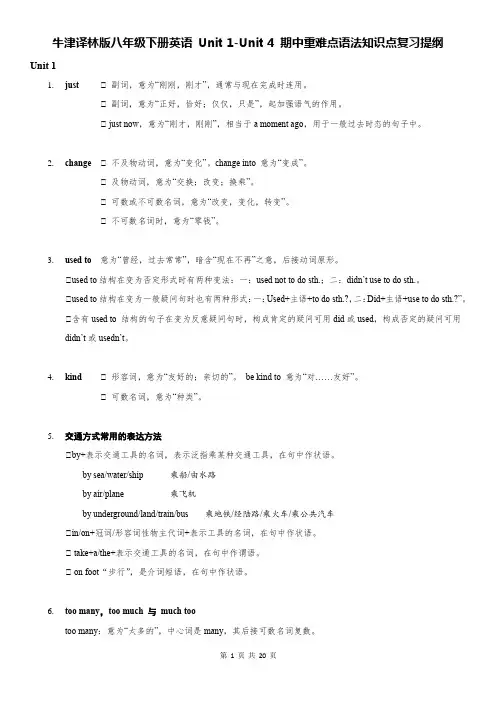
牛津译林版八年级下册英语Unit 1-Unit 4 期中重难点语法知识点复习提纲Unit 11.just ①副词,意为“刚刚,刚才”,通常与现在完成时连用。
① 副词,意为“正好,恰好;仅仅,只是”,起加强语气的作用。
① just now,意为“刚才,刚刚”,相当于a moment ago,用于一般过去时态的句子中。
2.change ①不及物动词,意为“变化”。
change into 意为“变成”。
① 及物动词,意为“交换;改变;换乘”。
① 可数或不可数名词,意为“改变,变化,转变”。
① 不可数名词时,意为“零钱”。
ed to意为“曾经,过去常常”,暗含“现在不再”之意,后接动词原形。
①used to结构在变为否定形式时有两种变法:一:used not to do sth.;二:didn’t use to do sth.。
①used to结构在变为一般疑问句时也有两种形式:一:Used+主语+to do sth.?,二:Did+主语+use to do sth.?”。
①含有used to 结构的句子在变为反意疑问句时,构成肯定的疑问可用did或used,构成否定的疑问可用didn’t或usedn’t。
4.kind① 形容词,意为“友好的;亲切的”。
be kind to 意为“对……友好”。
① 可数名词,意为“种类”。
5.交通方式常用的表达方法①by+表示交通工具的名词,表示泛指乘某种交通工具,在句中作状语。
by sea/water/ship乘船/由水路by air/plane乘飞机by underground/land/train/bus乘地铁/经陆路/乘火车/乘公共汽车①in/on+冠词/形容词性物主代词+表示工具的名词,在句中作状语。
① take+a/the+表示交通工具的名词,在句中作谓语。
① on foot“步行”,是介词短语,在句中作状语。
6.too many,too much 与much tootoo many:意为“太多的”,中心词是many,其后接可数名词复数。
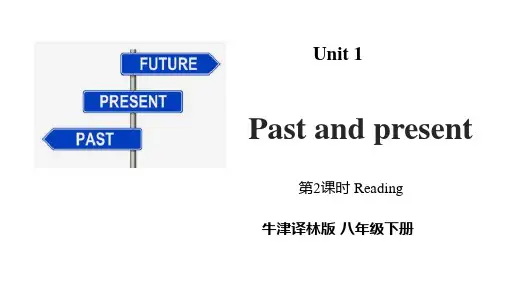
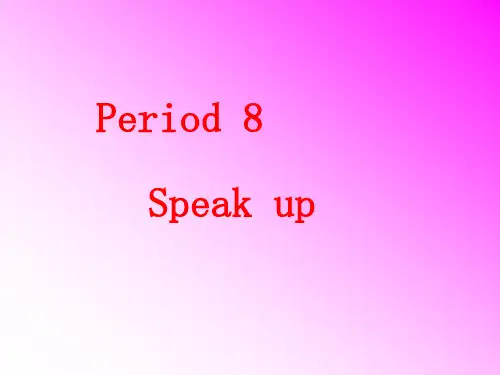
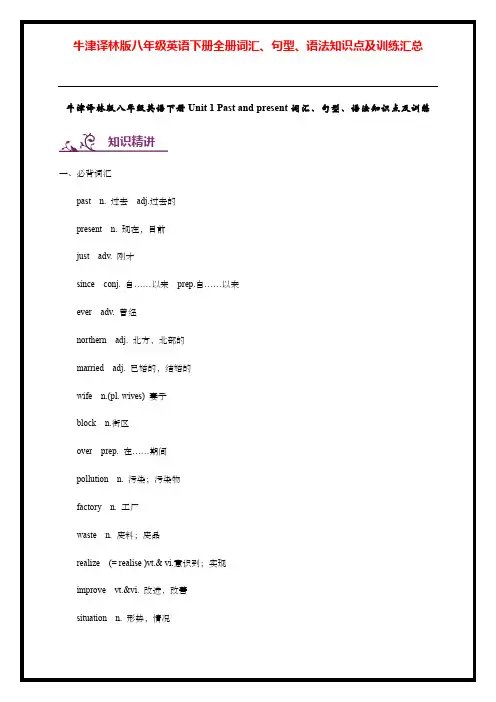
牛津译林版八年级英语下册Unit 1 Past and present词汇、句型、语法知识点及训练知识精讲一、必背词汇past n. 过去adj.过去的present n. 现在,目前just adv. 刚才since conj. 自……以来prep.自……以来ever adv. 曾经northern adj. 北方,北部的married adj. 已婚的,结婚的wife n.(pl. wives) 妻子block n.街区over prep. 在……期间pollution n. 污染;污染物factory n. 工厂waste n. 废料;废品realize (= realise )vt.& vi.意识到;实现improve vt.&vi. 改进,改善situation n. 形势,情况impossible adj. 不可能的before adv.以前,过去lonely adj. 孤独的,寂寞的anyway adv. 尽管,即使这样husband n. 丈夫interview n. 采访;会见yet adv. 还,仍recently adv.近来,最近environment n. 环境transport n.交通车辆,运输工具condition n. 环境,条件,状况return vi. 返回last adv.最近,上一次;最后abroad adv. 到(在)国外primary adj. 小学教育的;初级的communicate vt. &vi. 交流,交际exactly adv.(答语)正是,没错narrow adj. 狭窄的二、重点词汇1. present noun /ˈprez.ənt/1). something that you are given, without asking for it, on a special occasion, especially to showfriendship, or to say thank you(尤指表示友谊或致谢的)礼物,赠品例句:They gave me theatre tickets as a present.他们送给我戏票作为礼物。
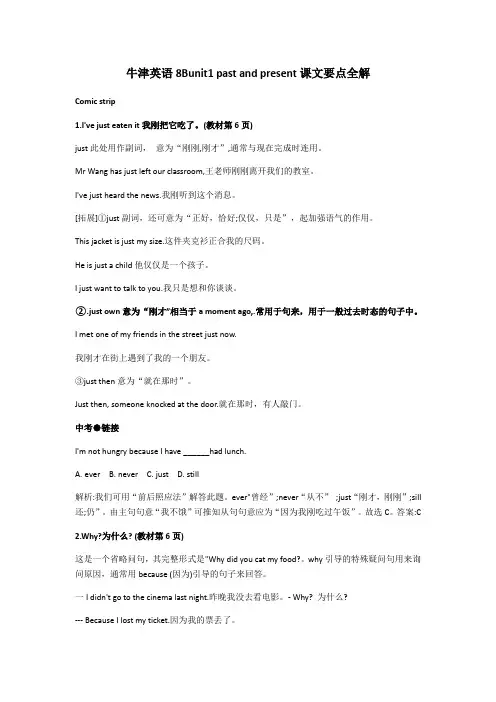
牛津英语8Bunit1 past and present课文要点全解Comic strip1.I've just eaten it我刚把它吃了。
(教材第6页)just此处用作副词,意为“刚刚,刚才”,通常与现在完成时连用。
Mr Wang has just left our classroom,王老师刚刚离开我们的教室。
I've just heard the news.我刚听到这个消息。
[拓展]①just副词,还可意为“正好,恰好;仅仅,只是”,起加强语气的作用。
This jacket is just my size.这件夹克衫正合我的尺码。
He is just a child他仅仅是一个孩子。
I just want to talk to you.我只是想和你谈谈。
②.just own意为“刚才”相当于a moment ago,.常用于句来,用于一般过去时态的句子中。
I met one of my friends in the street just now.我刚才在街上遇到了我的一个朋友。
③just then意为“就在那时”。
Just then, someone knocked at the door.就在那时,有人敲门。
中考●链接I'm not hungry because I have ______had lunch.A.everB. neverC. justD. still解析:我们可用“前后照应法”解答此题。
ever"曾经”;never“从不”;just“刚才,刚刚”;sill 还;仍”。
由主句句意“我不饿”可推知从句句意应为“因为我刚吃过午饭”。
故选C。
答案:C2.Why?为什么? (教材第6页)这是一个省略问句,其完整形式是"Why did you cat my food?。
why引导的特殊疑问句用来询问原因,通常用because (因为)引导的句子来回答。
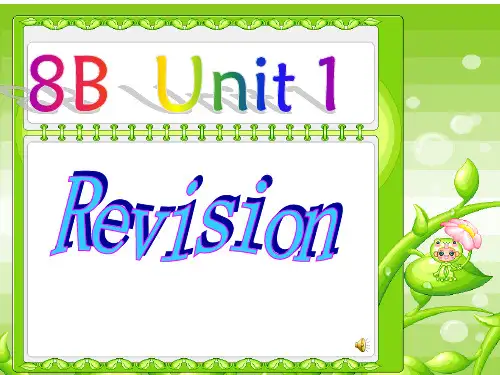

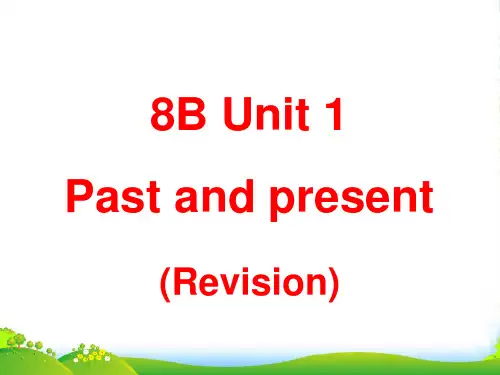
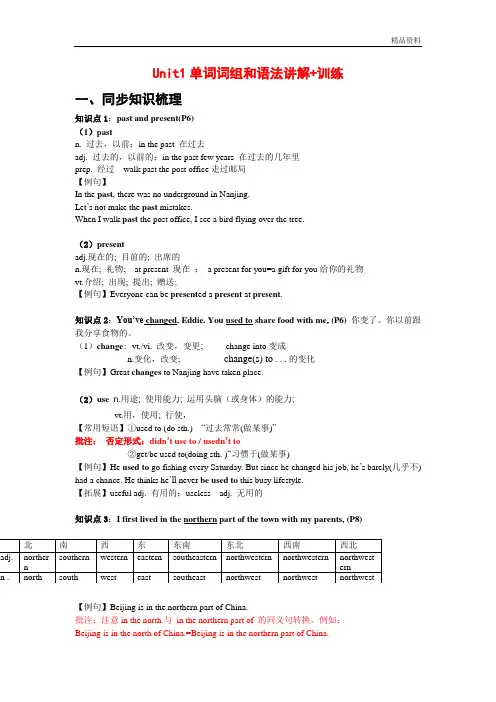
Unit1单词词组和语法讲解+训练一、同步知识梳理知识点1:past and present(P6)(1)pastn. 过去,以前;in the past 在过去adj. 过去的,以前的;in the past few years 在过去的几年里 prep. 经过 walk past the post office 走过邮局 【例句】In the past , there was no underground in Nanjing. Let ’s not make the past mistakes.When I walk past the post office, I see a bird flying over the tree.(2)presentadj.现在的; 目前的; 出席的n.现在; 礼物; at present 现在 ; a present for you=a gift for you 给你的礼物 vt.介绍; 出现; 提出; 赠送;【例句】Everyone can be present ed a present at present .知识点2:You’ve changed, Eddie. You used to share food with me .(P6) 你变了。
你以前跟我分享食物的。
(1)change : vt./vi. 改变,变更; change into 变成 n.变化,改变; change(s) to ...的变化 【例句】Great changes to Nanjing have taken place.(2)use n.用途; 使用能力; 运用头脑(或身体)的能力;vt.用,使用; 行使,【常用短语】①used to (do sth.) “过去常常(做某事)” 批注: 否定形式:didn ’t use to / usedn ’t to②get/be used to(doing sth. )“习惯于(做某事)【例句】He used to go fishing every Saturday. But since he changed his job, he ’s barely(几乎不) had a chance. He thinks he ’ll never be used to this busy lifestyle. 【拓展】useful adj. 有用的;useless adj. 无用的知识点3:I first lived in the northern part of the town with my parents .(P8)【例句】Beijing is in the northern part of China.批注:注意in the north 与 in the northern part of 的同义句转换。

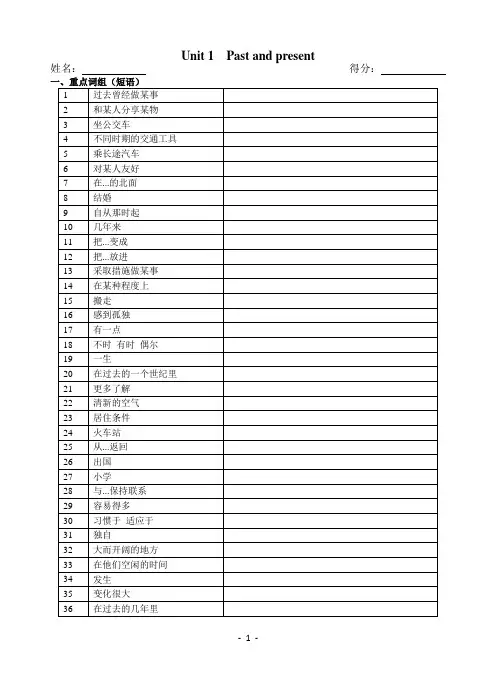
Unit 1 Past and present姓名:得分:二、重要句子(句型)1. 你过去常和我分享食物!2. 等下趟车花了很长时间。
3. 陈先生,你对阳光镇很熟悉吗?4. 我从出生以来就一直住在这里。
5. 你曾经搬过家吗?6. 现在政府已经把镇子的一部分变成了一个新公园。
7. 他们经常把废弃物排进河里。
8. 对于我们来说像以前一样经常见面已经不可能了。
9. 现在我有时感到有点孤独。
10. 她刚刚从美国回来。
11. 从那时起我们一直没有见过面。
12. 我们主要通过电子邮件交流。
13. 因特网使得交流容易多了。
14. 我的家乡发生了许多变化。
15. 很快适应生活的变化是不容易的。
Unit 1 Past and present二、重要句子(句型)1. You used to share food with me!你过去常和我分享食物!2. It took a long time to wait for the next one.等下趟车花了很长时间。
3. Do you know Sunshine Town very well, Mr Chen?陈先生,你对阳光镇很熟悉吗?4. I’ve lived here since I was born.我从出生以来就一直住在这里。
5. Have you ever moved house?你曾经搬过家吗?6. Now the government has turned part of the town centre into a new park.现在政府已经把镇子的一部分变成了一个新公园。
7. They often put the waste into the river.他们经常把废弃物排进河里。
8. It has become impossible for us to see each other as often as before.对于我们来说像以前一样经常见面已经不可能了。
Unit 1 Past and present 过去和现在【重点词汇】1.pass-passed-passed 过去past(1)[n.]过去①in the past在过去(2)[adj.]从前的;刚过去的①in the past few weeks近几周(3)介词[prep.](表示时间)在...之后;经过①twenty past five 5点二十(4)[adv.]经过①walk past走过2.present现在,目前at present目前,现在(1)[n.]礼物,礼品(2)[v.]赠送;颁发,授予(3)[adj.]①出席,在场(作表语或后置定语)②现存的,现在的(做前置定语)3.just [adv.]刚才(常与现在完成时连用)(1)恰好,正好相当于exactly(2)仅仅是;只是相当于only(3)just then就在那时相当于at that moment(4)just与just now区别①just常与现在完成时连用,位于实义动词之前,助动词、情态动词或系动词之后②just now常与一般过去时连用,相当于a moment ago,通常位于句末4.change(1)[v.]改变,更换①change/turn...into... 把...变成...(2)[n.]变化,变革;零钱(不可数名词)5.since[conj.]&[prep.]自……以来6.ever[adv.]曾经7.northern北方的,北部的southern western eastern8.married已婚的,结婚的(1)get married结婚(2)be married已婚(3)be/get married to sb.与某人结婚9.wife妻子-wives[pl.](1)knife-knives(2)wolf-wolves(3)thief-thieves(4)half-halves(5)leaf-leaves10.away[adv.]离开,在(某距离)处(1)go away离开(2)right away立刻(3)take away带走(4)run away逃离(5)put away收起来(6)far away远离(7)keep...away from... 使...远离...11.block街区12.pollution污染;污染物(1)[v.]pollute(2)light pollution光污染(3)air pollution空气污染(4)water pollution水污染(5)noise pollution噪声污染13.problem[n.]问题,难题(1)question与ask/answer(2)problem难以解决问题solve/work out连用14.factory工厂15.waste(1)废料;废品(不可数名词)(2)[n.]浪费,可以和冠词a连用(3)[adj.]废弃的,无用的;荒芜的(4)[v.][新义]浪费,滥用①waste sth. on sth.浪费某物在某物/事上②waste sth. (in) doing sth.浪费某物做某事16.realize[v.]意识到;实现(1)realize实现,是及物动词,被实现(2)come true实现,成为现实,是不及物动词,不能用于被动语态17.situation形势,情况18.husband丈夫19.impossible[adj.]不可能的(1)impossibly[adv.](2)possible[adj.]-possibly[adv.](3)possibility[n.]可能性20.interview采访;会见[新义]n.对……进行面试;采访21.environment环境condition环境,条件,状况22.lonely和alone(1)lonely形容词孤独的,强调人的内心感受;偏僻的。